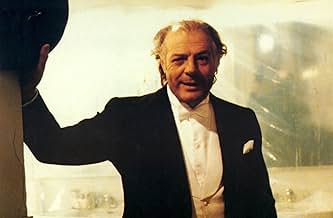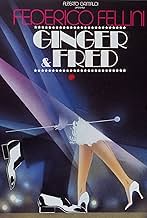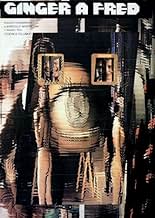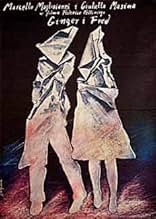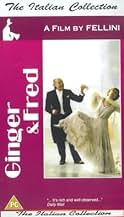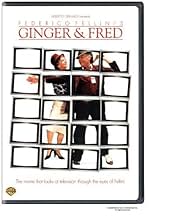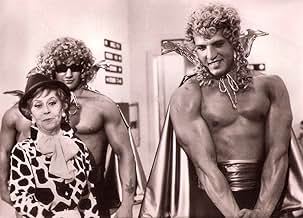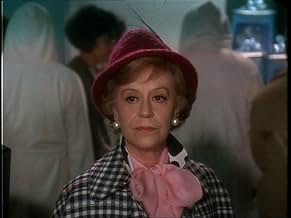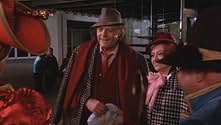AVALIAÇÃO DA IMDb
7,2/10
5,7 mil
SUA AVALIAÇÃO
Amelia e Pippo reúnem-se após muitas décadas, para apresentar-se em um show de variedades na tv.Amelia e Pippo reúnem-se após muitas décadas, para apresentar-se em um show de variedades na tv.Amelia e Pippo reúnem-se após muitas décadas, para apresentar-se em um show de variedades na tv.
- Indicado para 1 prêmio BAFTA
- 18 vitórias e 18 indicações no total
Friedrich von Ledebur
- Admiral Aulenti
- (as Frederick Ledebur)
Jacques Henri Lartigue
- Brother Gerolamo
- (as Jacques Henry Lartigue)
Totò Mignone
- Totò
- (as Toto Mignone)
Antoine Saint-John
- Bandaged man
- (as Antoine Saint Jean)
Friedrich von Thun
- Kidnapped Industrialist
- (as Frederich Thun)
Antonino Iuorio
- Production Inspector
- (as Antonio Iuorio)
Enredo
Você sabia?
- CuriosidadesUpon the film's release in the USA, Ginger Rogers sued the production and the distributors for 'misappropriation and infringement of her public personality'. The case was dismissed, the judgment stating that the film referred to her and Fred Astaire only obliquely.
- Citações
Clark Gable: One moment, madam. In my birthday suit, I look like a Greek god.
Amelia Bonetti: Then get back to the museum. Goodbye.
- ConexõesFeatured in At the Movies: The Money Pit/Ginger and Fred (1986)
Avaliação em destaque
Fellini is perhaps the only director whose movies could never be adapted into books. The Maestro has invented a purely cinematic language to speak his own heart and tell his stories no matter how disjointed and anarchic they were for the discoverer, I guess his unique style would simply suffocate inside the restrictive format of words. Sure, drawings can give glimpses on his extravagant visions but still too static to convey the sense of fun and buoyancy he injects in his material. They could make interesting comic strips though but would they work the same without Nino Rota or Nicola Piavani's music?
Fellini movies are made for either the stage or the screen, their delights are essentially visual and musical, their enjoyment works on a sensitive and emotional rather than intellectual level. This is the old magic formula that made glorious days of Hollywood and Broadway, providing the kind of entertainment books and radio couldn't, that era immortalized by Chaplin, Laurel and Hardy, Walt Disney cartoons and of course musicals, and one of the most emblematic moments of that long gone period is Fred Astaire and Ginger Rogers dancing "Cheek to Cheek". That heavenly scene immortalized by countless homages, notably from "The Green Mile" and Woody Allen's "Purple Rose of Cairo".
Fellini's "Ginger and Fred" is impregnated with a similar dose of nostalgia although we never see the legends, we don't need their last names, we don't need the lyrics to remember "Top Hat", we don't need Giuletta Masina to look like Ginger Rogers and she doesn't even pretend to be a lookalike while Marcello Mastroianni isn't exactly the thin and slender Astaire type. Yet the two Hollywood stars bright through the sole passion of Amelia (Masina) and Pippo (Mastroianni). Listen to her describing the choreography or her days of glory during interviews or Pippo, in one of the film's most inspired scenes, explaining the origins of tap dancing. Their listeners aren't always captivated but we know they're not talking to them but to us movie lovers fascinated by these Last Mohicans of Hollywood Golden Age... Italian style.
The homage itself is pure Fellini style, any lesser director would have made this love letter to Hollywood a sort of solemn prosternation... watching "Ginger and Fred" made me realize how willing even good movies like "The Artist" or "La La Land" were to recreate the magic at the expense of their personal touch, sinning by moments of sentimental manipulation. "Ginger and Fred" is nostalgic all right, but it's exuberant and transgressive like any Fellini film. The director turns the couple into decoy protagonists in a crazy universe, an avalanche of debauchery that makes them totally outdated. Behind the nostalgia, there's a commentary on how far the art of entertainment went, becoming as decadent as his portrayal of Rome like in "Satyricon". Good directors flash the lost innocence before our eyes, Fellini focuses on the much groovier hell.
What is the place of a tap dancing couple in a world where TV and pop electronic music waters its audience with a keleidoscope of sex, games, ads and random images designed to ignite masses lowest instincts? When Amelia is approached by an unimpressed journalist and driven to the hotel before the studio representation, she is surrounded by so many characters her frailty is enhanced: has-been artists, lookalikes, impersonators, dwarves... what have they in common? They're just weird, bizarre-looking or entertaining in a non-traditional way. It's eerie how Fellini prophecized the reality shows and their exploitations of wannabe celebrities and pseudo artists treated like freaks. There's a scene where Amelia is asked whether she's married to Pippo, if she was, that would have interested the audience even more. There's no place anymore for genuine interest, people want to be shocked, dazzled, or surprised, it's a giant leap made in five decades.
Having a foot in each world and being a true ringmaster, Fellini reconciles these two schools of entertainment, allowing within that orgy of telegenic bizarreness a few breaks to Amelia and Pippo, I didn't mind these crazy vignettes as they're part of the Fellinian experience but sometimes they can be too exhausting and so I enjoyed these brief moments of truce where Amelia and Pippo shared a few memories. I loved their complicity all through their film and one of the masterstrokes was the blackout before the act, so we could breath a little and listen to them commenting the mess surrounding them. It's interesting to see that they're lucid about their status, but they are willing to give the audience what they want, for the sake of their art. For all its anarchical structure, carried by that catchy soundtrack, Fellini can't resist the temptation of sentimentalism and that's a wise choice, as he allows his two fetish actors to have a substantial role at the dawn of their career, he even recast Franco Fabrizi as the host show, he who starred in his early neo-realist films.
In its "final show before the curtain closes" undertones, "Ginger and Fred" reminded me of Chaplin's "Limelight". The film has its slower moments but it's surprisingly grabbing and never dull or boring, Amelia and Pippo gravitate around these bizarre figures of entertainments like a Greek chorus we can relate to. At the end, they become Ginger and Fred in our hearts. And the film ends as it started, but at night in a deserted train station, with the two actors paying the kind of goodbyes that resonate like poignant farewells. But at long as they saw each other, that mess was all worth it, and since there's no Fellini film without the "film in the film" element, at least Il Dottore gratified us with a last reunion with his fetish actors: Masina and Mastroianni ... if only for that, "Ginger and Fred" deserves to be watched and appreciated.
Fellini movies are made for either the stage or the screen, their delights are essentially visual and musical, their enjoyment works on a sensitive and emotional rather than intellectual level. This is the old magic formula that made glorious days of Hollywood and Broadway, providing the kind of entertainment books and radio couldn't, that era immortalized by Chaplin, Laurel and Hardy, Walt Disney cartoons and of course musicals, and one of the most emblematic moments of that long gone period is Fred Astaire and Ginger Rogers dancing "Cheek to Cheek". That heavenly scene immortalized by countless homages, notably from "The Green Mile" and Woody Allen's "Purple Rose of Cairo".
Fellini's "Ginger and Fred" is impregnated with a similar dose of nostalgia although we never see the legends, we don't need their last names, we don't need the lyrics to remember "Top Hat", we don't need Giuletta Masina to look like Ginger Rogers and she doesn't even pretend to be a lookalike while Marcello Mastroianni isn't exactly the thin and slender Astaire type. Yet the two Hollywood stars bright through the sole passion of Amelia (Masina) and Pippo (Mastroianni). Listen to her describing the choreography or her days of glory during interviews or Pippo, in one of the film's most inspired scenes, explaining the origins of tap dancing. Their listeners aren't always captivated but we know they're not talking to them but to us movie lovers fascinated by these Last Mohicans of Hollywood Golden Age... Italian style.
The homage itself is pure Fellini style, any lesser director would have made this love letter to Hollywood a sort of solemn prosternation... watching "Ginger and Fred" made me realize how willing even good movies like "The Artist" or "La La Land" were to recreate the magic at the expense of their personal touch, sinning by moments of sentimental manipulation. "Ginger and Fred" is nostalgic all right, but it's exuberant and transgressive like any Fellini film. The director turns the couple into decoy protagonists in a crazy universe, an avalanche of debauchery that makes them totally outdated. Behind the nostalgia, there's a commentary on how far the art of entertainment went, becoming as decadent as his portrayal of Rome like in "Satyricon". Good directors flash the lost innocence before our eyes, Fellini focuses on the much groovier hell.
What is the place of a tap dancing couple in a world where TV and pop electronic music waters its audience with a keleidoscope of sex, games, ads and random images designed to ignite masses lowest instincts? When Amelia is approached by an unimpressed journalist and driven to the hotel before the studio representation, she is surrounded by so many characters her frailty is enhanced: has-been artists, lookalikes, impersonators, dwarves... what have they in common? They're just weird, bizarre-looking or entertaining in a non-traditional way. It's eerie how Fellini prophecized the reality shows and their exploitations of wannabe celebrities and pseudo artists treated like freaks. There's a scene where Amelia is asked whether she's married to Pippo, if she was, that would have interested the audience even more. There's no place anymore for genuine interest, people want to be shocked, dazzled, or surprised, it's a giant leap made in five decades.
Having a foot in each world and being a true ringmaster, Fellini reconciles these two schools of entertainment, allowing within that orgy of telegenic bizarreness a few breaks to Amelia and Pippo, I didn't mind these crazy vignettes as they're part of the Fellinian experience but sometimes they can be too exhausting and so I enjoyed these brief moments of truce where Amelia and Pippo shared a few memories. I loved their complicity all through their film and one of the masterstrokes was the blackout before the act, so we could breath a little and listen to them commenting the mess surrounding them. It's interesting to see that they're lucid about their status, but they are willing to give the audience what they want, for the sake of their art. For all its anarchical structure, carried by that catchy soundtrack, Fellini can't resist the temptation of sentimentalism and that's a wise choice, as he allows his two fetish actors to have a substantial role at the dawn of their career, he even recast Franco Fabrizi as the host show, he who starred in his early neo-realist films.
In its "final show before the curtain closes" undertones, "Ginger and Fred" reminded me of Chaplin's "Limelight". The film has its slower moments but it's surprisingly grabbing and never dull or boring, Amelia and Pippo gravitate around these bizarre figures of entertainments like a Greek chorus we can relate to. At the end, they become Ginger and Fred in our hearts. And the film ends as it started, but at night in a deserted train station, with the two actors paying the kind of goodbyes that resonate like poignant farewells. But at long as they saw each other, that mess was all worth it, and since there's no Fellini film without the "film in the film" element, at least Il Dottore gratified us with a last reunion with his fetish actors: Masina and Mastroianni ... if only for that, "Ginger and Fred" deserves to be watched and appreciated.
- ElMaruecan82
- 29 de ago. de 2020
- Link permanente
Principais escolhas
Faça login para avaliar e ver a lista de recomendações personalizadas
- How long is Ginger & Fred?Fornecido pela Alexa
Detalhes
- Data de lançamento
- Países de origem
- Idiomas
- Também conhecido como
- Ginger & Fred
- Locações de filme
- Empresas de produção
- Consulte mais créditos da empresa na IMDbPro
Bilheteria
- Faturamento bruto nos EUA e Canadá
- US$ 837.623
- Fim de semana de estreia nos EUA e Canadá
- US$ 22.725
- 30 de mar. de 1986
- Faturamento bruto mundial
- US$ 837.953
Contribua para esta página
Sugerir uma alteração ou adicionar conteúdo ausente

Principal brecha
By what name was Ginger e Fred (1986) officially released in India in English?
Responda

